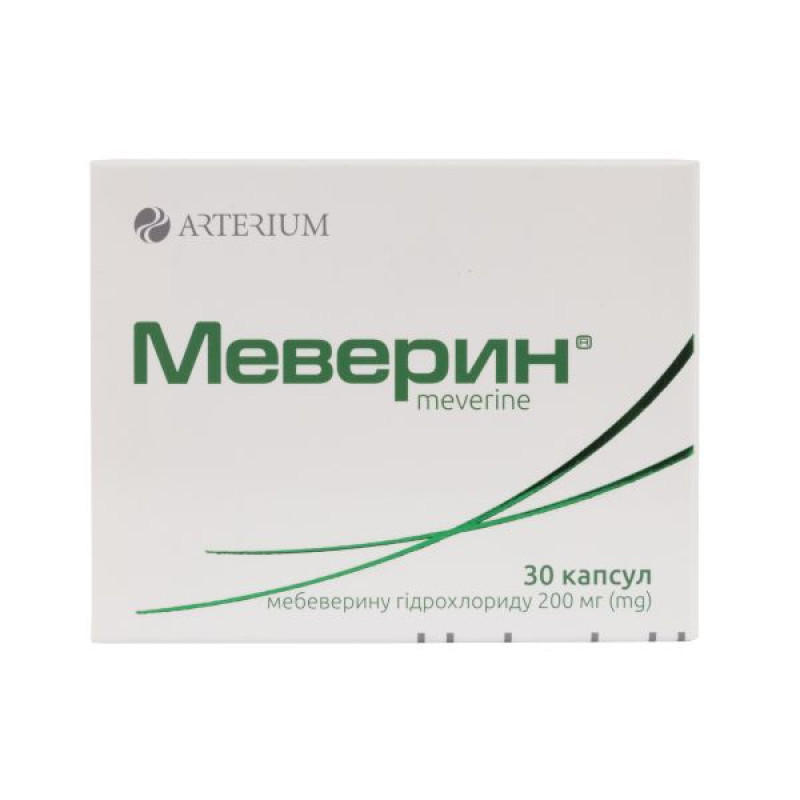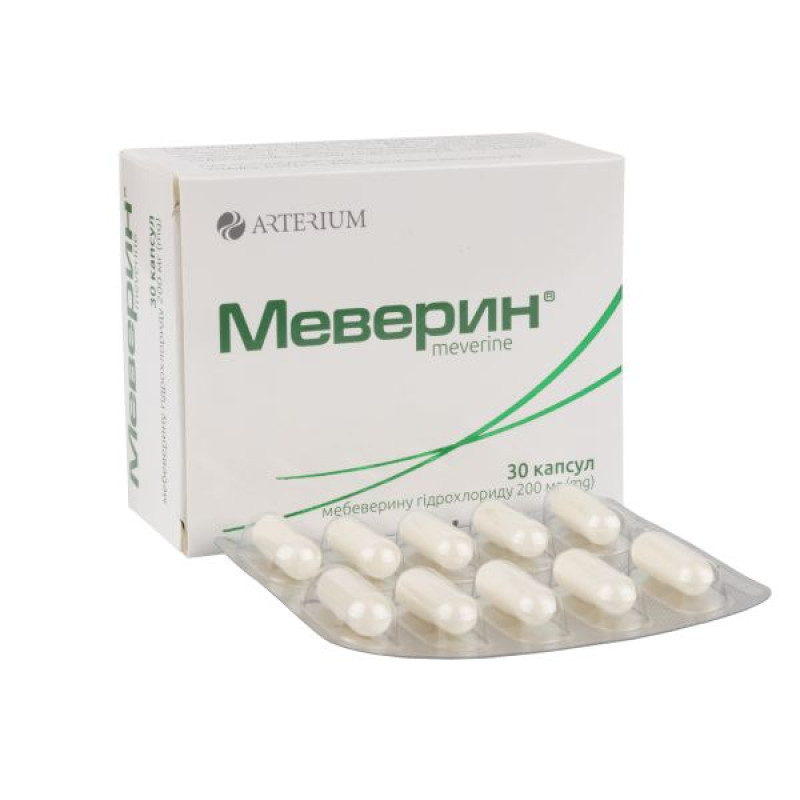Meverin capsules 200 mg blister No. 30

Instructions for Meverin capsules 200 mg blister No. 30
Composition
active ingredient: mebeverine;
1 capsule contains mebeverine hydrochloride, pellets containing the substance, calculated as mebeverine hydrochloride - 200 mg;
excipients included in the pellets: sucrose, corn starch, povidone, ethyl cellulose, talc, shellac;
capsule shell: titanium dioxide (E 171), gelatin.
Dosage form
Capsules.
Main physicochemical properties: hard gelatin capsules No. 1, white in color. Capsule contents – granules (pellets) of white or almost white, or white with a creamy tint, spherical in shape.
Pharmacotherapeutic group
Drugs used in functional gastrointestinal disorders. Synthetic anticholinergics, esterified tertiary amines. ATX code A03A A04.
Pharmacological properties
Pharmacodynamics.
Mechanism of action and pharmacodynamic effects.
Meverin is a myotropic antispasmodic with a selective effect on the smooth muscles of the digestive tract. In therapeutic doses, the drug blocks the sodium channels of the membranes of smooth muscle cells, prevents the entry of sodium ions into the cell and spasm of the smooth muscles of the internal organs. Eliminates spasm without affecting normal intestinal peristalsis. Unlike anticholinergics, Meverin does not act on M-cholinergic receptors and does not exhibit side effects characteristic of antispasmodics with M-cholinergic blocking action (dry mouth, visual impairment, urinary retention), which allows its use in patients with prostatic hypertrophy or glaucoma. The use of the drug Meverin is not accompanied by the development of reflex intestinal hypotension.
Children.
Mebeverine is also effective in relieving symptoms of irritable bowel syndrome in children.
The dosage regimen of the capsules is calculated based on the safety and tolerability of mebeverine.
Pharmacokinetics.
Absorption.
Mebeverine is rapidly and completely absorbed after oral administration in tablet form. Due to the prolonged release of the drug from the capsule, it can be taken twice a day.
Distribution.
With repeated use of the drug Meverin, no significant cumulation occurs.
Biotransformation.
Mebeverine hydrochloride is mainly metabolized by esterases, which in the first stage of metabolism cleave ester bonds to form veratric acid and mebeverine alcohol.
Breeding.
Mebeverine is not excreted unchanged, it is completely metabolized, and the metabolites are excreted almost completely. Veratric acid is excreted in the urine. Mebeverine alcohol is also excreted by the kidneys in the form of the corresponding carboxylic or desmethylcarboxylic acid.
Children.
Pharmacokinetic studies in children have not been conducted.
Indication
Adults and children aged 10 and over:
– symptomatic treatment of pain, spasms, intestinal disorders and discomfort in the intestines in irritable bowel syndrome;
– treatment of gastrointestinal spasms of secondary genesis caused by organic diseases.
Contraindication
Hypersensitivity to the active substance or to any of the inactive components of the drug.
Interaction with other medicinal products and other types of interactions
Interaction studies with alcohol have been conducted. In vitro and in vivo animal studies have demonstrated the absence of any interaction between mebeverine and ethanol.
Application features
Due to the sucrose content, patients with rare hereditary problems of fructose intolerance, glucose-galactose malabsorption or sucrase-isomaltase insufficiency are not recommended to use the drug.
Do not use the drug in patients with porphyria.
Since the drug does not exhibit the usual anticholinergic side effects, it can be used in patients with prostatic hypertrophy and glaucoma.
Use the drug with caution in patients with severe hepatic and renal insufficiency, heart block.
Use during pregnancy or breastfeeding
There are only very limited data from the use of mebeverine in pregnant women. Animal reproductive toxicity studies are insufficient. Mebeverine is not recommended for use during pregnancy.
It is not known whether mebeverine or its metabolites are excreted in human milk. The excretion of mebeverine in animal milk has not been studied. Mebeverine should not be used during breast-feeding.
There are no clinical data on the effects on male or female fertility, however, animal studies do not indicate harmful effects of mebeverine.
Ability to influence reaction speed when driving vehicles or other mechanisms
No studies on the effects on the ability to drive and use machines have been conducted. The pharmacodynamic and pharmacokinetic profile, as well as post-marketing experience, do not indicate any harmful effects on the ability to drive and use machines.
Method of administration and doses
Capsules should be taken with sufficient water (at least 100 ml). Do not chew the capsules.
Adults and children over 10 years of age should take 1 capsule 2 times a day (morning and evening).
The duration of use is unlimited. If one or more doses are missed, the patient should take the next dose as prescribed. The missed dose(s) should not be taken in addition to the regular dose.
There is no evidence of a specific risk for the elderly, patients with renal and/or hepatic impairment. No dose adjustment is necessary for the above patient groups.
Children.
Mebeverine hydrochloride should not be used in children under 3 years of age due to the lack of clinical data for this age group. Mebeverine capsules should also not be used in children aged 3 to 10 years due to the high content of the active substance.
Overdose
In case of overdose, excitation of the central nervous system may theoretically occur. In cases of overdose with mebeverine, symptoms were absent or mild and disappeared quickly. The symptoms of overdose that were observed were of neurological or cardiovascular origin. A specific antidote is not known. Symptomatic treatment is recommended. Gastric lavage is recommended only in case of intoxication with multiple drugs, which is diagnosed within 1 hour of taking the drugs. Measures to reduce absorption are not necessary.
Adverse reactions
The following adverse reactions have been reported spontaneously during post-marketing use. The frequency cannot be estimated precisely from the available data.
Allergic reactions, mainly skin reactions, have been observed.
Skin and subcutaneous tissue disorders:
urticaria, angioedema, facial swelling and rash.
On the part of the immune system:
hypersensitivity (anaphylactic reactions).
Expiration date
3 years.
Storage conditions
Store in the original packaging at a temperature not exceeding 25 °C.
Keep out of reach of children.
Packaging
Capsules of 200 mg No. 10 in a blister, 3 blisters in a pack.
Vacation category
According to the recipe.
Producer
PJSC "Kyivmedpreparat".
Location of the manufacturer and address of its place of business.
Ukraine, 01032, Kyiv, Saksaganskoho St., 139.
There are no reviews for this product.
There are no reviews for this product, be the first to leave your review.
No questions about this product, be the first and ask your question.












